Industry News
As a means of tackling the issue of waste in the supply chain, the UK retailer has launched a new pack of imperfect tomatoes

UK supermarket chain Waitrose has announced that it is selling mixed packs of tomatoes that have either naturally fallen from the vine or are misshapen, as it looks at ways to reduce waste at its stores, The Guardian has reported.
Such tomatoes would not usually be put on sale, but criticism from campaigners has forced retailers to act. Waitrose has previously had success selling misshapen strawberries and plums, as well as weather-blemished apples, at a discount.
Waitrose tomato buyer Peter Cooke commented: “When it comes to tomatoes, there’s absolutely no reason why beauty has to be skin deep. Every one of our mixed selection packs is different, which for me is the real beauty of using tomatoes that wouldn’t normally be offered in this way to customers.”
According to Waitrose, tomatoes are, along with avocados, one of the leading causes of waste in the fruit and vegetables category.
The retailer’s ‘Limited Selection’ tomatoes will reportedly be available in 77 Waitrose outlets in the UK, priced at £2.99 for 1kg. The first pack includes a mixture of round, cherry and baby plum varieties, but each will vary depending on seasonal availability, Waitrose stated.
New study suggests regular grape consumption could protect the retina from deterioration
New research presented recently at the Association for Research in Vision and Ophthalmology conference in Orlando, Florida, has suggested that regular grape consumption may play a role in eye health by protecting the retina from deterioration.
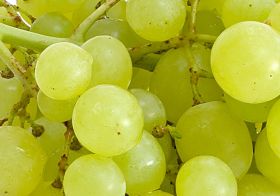
Specifically, the research said that a grape-enriched diet resulted in a protective effect on retinal structure and function.
The retina is the part of the eye that contains the cells that respond to light, known as photoreceptors. There are two types of photoreceptors: rods and cones. Retinal degenerative diseases affect over 5m people in the US, and can cause blindness due to photoreceptor cell death.
The study was conducted by a research team at the University of Miami, Bascom Palmer Eye Institute, and investigated whether a diet supplemented with grapes could protect the photoreceptors in mice that have retinal degeneration. Mice were either fed a grape-supplemented diet corresponding to 3 servings of grapes per day for humans or one of two control diets.
The results showed that retinal function was significantly protected in the mice consuming the grape-enriched diet. The grape-consuming group had three-fold higher rod and cone photoreceptor responses compared with those on the control diets. They also exhibited thicker retinas. Grape consumption also protected retinal function in an oxidative stress model of macular degeneration. Further analysis revealed that the grape diet resulted in lower levels of inflammatory proteins and higher amounts of protective proteins in the retinas.
“The grape-enriched diet provided substantial protection of retinal function which is very exciting,” said Dr Abigail Hackam, lead investigator of the study. “And it appears that grapes may work in multiple ways to promote eye health from signaling changes at the cellular level to directly countering oxidative stress.”
The Association for Research in Vision and Ophthalmology (ARVO) is the largest eye and vision research organisation in the world with eye and vision research members from over 70 countries.
A decision has been taken by the EU to strengthen rules on imports of South African citrus due to the risk of citrus black spot

South African citrus exports to Europe will be subject to stricter controls but will not face an outright ban, Eurofruit has learned, after the EU’s Standing Committee on Plant Health reached agreement on a revised import protocol today in Brussels.
The agreement reached by the committee marks the end of a particularly difficult chapter in the history of trade relations between South Africa and the EU, one which saw producers in Spain, Italy and France demand South African citrus be denied entry on the grounds of a perceived risk of the disease citrus black spot establishing itself in Europe.
According to the new measures, citrus fruits imported from South Africa will be subject to more stringent criteria such as recording pre- and post-harvest chemical treatments and mandatory registration of packhouses, as well as on-site official inspections at citrus orchards.
A sample of at least 600 of each type of citrus fruit per 30 tonnes will have to be taken by the South African authorities, with all fruit showing symptoms to be tested. Moreover, a sample per 30 tonnes of Valencia oranges will also be tested. No distinction between citrus fruits for fresh consumption and citrus fruits for processing is made.
Commissioner for Health Tonio Borg commented: “Plant protection on EU territory is of the utmost importance and the EU had no choice but to impose a stricter inspection regime for South African citrus fruit. Systematic sampling and testing of consignments should prevent this harmful plant disease from taking hold in Europe’s citrus orchards to the detriment of our farming sector. We had to take these measures because of the high number of recent interception of infected citrus fruits at European border controls.”
That perceived risk has been a matter of some contention, with South Africa receiving the backing of trade counterparts in northern Europe and a sizeable group of scientists worldwide despite strong support for a ban from the European Food Safety Authority and Mediterranean growers.
In late November, the EU imposed what amounted to a provisional ban on imports of citrus from the country, but that blockade came to an end at the start of 2014, meaning a further decision on the future of South African citrus in Europe had to be made during what is currently the export trade’s off season.
Jan Doldersum of Rijk Zwaan will champion the use of social media at the upcoming European Vegetable Strategies event

Using social media to grow the salads category is an exciting opportunity for companies provided they also understand the challenges that is poses.
That’s the message that Rijk Zwaan marketing and business development manager Jan Doldersum is going to give to delegates at European Vegetable Strategies 2014, the new international conference event for the European fresh vegetable sector that takes place in Brussels at the start of next month.
Rijk Zwaan, a family-owned business that is one of the world’s leading seed companies, launched its Love My Salad website in Europe a couple of years ago, and opened a “social salad network” in China last year too. The website, which is available in 13 languages at lovemysalad.com, has attracted millions of hits and many thousands of likes from users all over the world. It gives users the chance to inform themselves about salads and to share recipe ideas and much more.
“Social media is a great way to communicate with consumers,” says Jan Doldersum. “But social media requires constant attention, and you’ve got to be very careful about things like internet security. It’s a big challenge.”
Rijk Zwaan is presenting its ideas in keynote sessions at European Vegetable Strategies 2014 at the Hotel Bloom in Brussels on Thursday 5 June. The event opens the previous evening with an informal get-together at Brussels’ renowned art nouveau brasserie De Ultieme Halluncinatie.
Rijk Zwaan is a key sponsor of European Vegetable Strategies 2014, which is organised by Europe’s leading fresh produce trade magazines, Eurofruit, Fruchthandel Magazin, and Fresh Produce Journal.
Some 120-150 senior managers from fresh produce businesses in Europe are due to attend EVS2014 on 4-5 June 2014. More information is available online at http://www.vegetablecongress.com/
Retailer targets greater transparency in effort to position itself as UK market’s fresh-led value food retailer
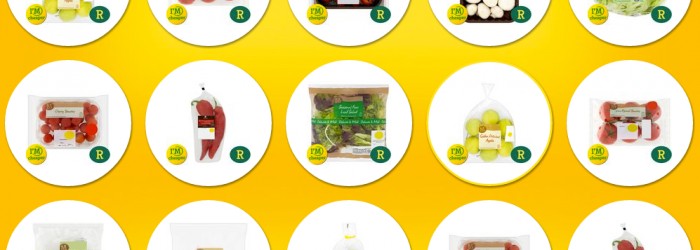
Morrisons, the UK’s fourth-largest grocery retailer, has launched an online price-checking service designed to reassure shoppers that price cuts during any particular week are not simply temporary promotions designed to boost sales in a particular week.
The move follows the company’s recent announcement that it was going to be “permanently cheaper” by pursuing a strategy of price reductions on 1,200 everyday essential items in order to build its reputation as a fresh-led value grocer.
Industry analyst MySupermarket.com, which is running the service, will monitor price reductions across Morrisons’ entire range and publish its findings on the website, providing visual illustrations of individual products’ pricing history.
Shoppers will be able to look at any of the products on offer and check the retailer hasn’t in fact put prices up.
Commenting on the new price transparency website, Morrisons chief executive Dalton Philips said: “We’re serious about getting cheaper and setting new standards in transparency of pricing. We want our customers to be proud of the products they buy and be reassured that they are cheaper. We have nothing to hide.”
The cheaper prices are already being communicated to customers through a new marketing campaign with the strap line ‘I’m Your New Cheaper Morrisons’.
New Zealand is now producing more fruit than it did a decade ago, despite planted area contracting by around a quarter
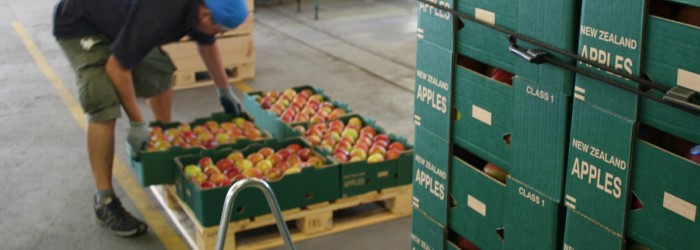
New Zealand is expected to ship around 310,000 tonnes of apples this season – a pleasantly surprising result for the country’s growers during what is an off year in their trees’ biennial bearing cycle.
Last year’s full crop yielded a 12% increase in shipments overseas to 324,684 tonnes, according to industry body Pipfruit NZ, and this year’s export volumes had been expected to fall back in line with a downturn in production to around 480,500 tonnes.
However, exporters had already expressed confidence at the start of the 2014 campaign about the prospects for NZ apples, mainly based on the anticipated demand for smaller-sized fruit in key markets such as the UK and the fact that frosts in Chile and hail in South Africa would mean availability of those sizes was under pressure from the start of the season.
New Zealand’s apple export trade has also been aided by a further increase in demand from the developing Asian market, where volumes sold to China and Hong Kong increased from 15,268 tonnes in 2012 to 21,443 tonnes last year, despite a temporary suspension of shipments in September.
The country’s top five export markets in 2013 were the UK (44,312 tonnes), US (), Netherlands (), Thailand () and Belgium (). A significant proportion of shipments to the Netherlands and Belgium were re-routed to other markets across Europe, with demand boosted by a smaller Northern Hemisphere crop and, again, damage to crops in Chile and South Africa.
Thailand, meanwhile, has emerged as one of the shining examples of successful market diversification: in just five years, it has gone from importing less than 8,000 tonnes of NZ apples to almost 28,000 tonnes in 2013.
Similar dramatic increases have been observed in the UAE, which imported 18,404 tonnes in 2013 – four times the 2008 figure; in India, up from 4,966 tonnes to 14,330 tonnes during the same period; and in Vietnam, now taking around 3,000-4,000 tonnes compared with just 750 five years before.
New Zealand also appears to be reaping the rewards of a sizeable increase in productivity as the sector has consolidated in the post-deregulation era.
Figures released by Pipfruit NZ show that, while planted area for apples has declined by nearly 25% since 2005, production of export-grade fruit is at a similar, if not higher, level now to that seen a decade ago.
Former chef and ex-manager at 2 Sisters Food Group, Bryan Nelson, will take over accounts for Freshtime’s largest retail customers

Growing salad and vegetable company Freshtime has boosted its management team with the addition of former chef Bryan Nelson.
Nelson, who has been working in the food industry for 20 years, will handle Freshtime’s three largest retail customers in his role of national account manager.
Having opened a restaurant in Aberdeen, Nelson has also previously worked as commercial manager at Young’s Seafood and new business manager at 2 Sisters Food Group.
“This business is ready to expand and I’m looking forward to being part of it,” he said. “Our managing director Mark Newton was a huge influence on my decision to come here. I knew the company before I joined; Mark has told me about his plans for the future and it’s ready to take off.”
Newton confirmed that the company is in the process of building a strong team to take Freshtime to the next level. “Bryan has extensive experience and in-depth knowledge of the food industry and will be a real asset to the company,” he said.
Freshtime employs over 300 people and supplies prepared vegetables and salads to multiple retailers and food service operators.
Pakistan’s projections of mango exports are set to stay largely unchanged from previous years, despite the EU ban on Indian mangoes
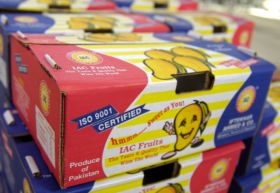
Pakistan’s mango exports are forecast to be valued at US$65m by the end of the season, only slightly higher than last year’s US$60m, said the Pakistan Fruit and Vegetable Exporters, Importers and Merchants Association (PFVA) in a statement released this week, according to the Express Tribune.
Despite the EU ban on Indian imports, the PFVA is not forecasted growth for its own mango exports, with the season due to begin 25 May. PFVA spokesman Waheed Ahmed told the Tribune that mango production would drop to 1.45m tonnes, from 1.85m tonnes in 2013, due to poor weather conditions hitting the country’s key mango producing regions.
Pakistan will now focus on quality not quantity of produce, said Ahmed, and would be looking to export to potential new markets of South Korea and Australia, and will continue trade with Europe, where it currently ships 24,000 mangoes annually.
Exports are still closed to the US and Japan, along with a severed trade agreement with Iran following US international sanctions, costing Pakistan US$10 in mango exports annually.
New entity will trade as Hortifrut Expofresh SA and will focus on development of early season blueberry varieties
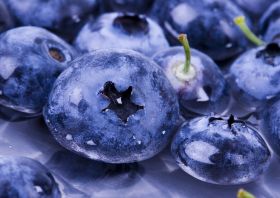
Hortifrut has announced that it is to merge its Argentine operations with Expofresh to jointly develop exclusive early season blueberry varieties for international markets.
Announcing the union, which includes Expofresh’s Tucumán-based production units, Tierra de Berries and Tierra de Arándanos, the companies said it would allow the companies to share logistical synergies and improve levels of customer service.
Both companies will begin working together ahead of the 2014/15 season before the new venture, to be known as Hortifrut Expofresh SA, is formalised.
“This important partnership allows us to collaborate to strengthen the security of high quality early blueberry supply from Argentina to Hortifrut’s commercial platforms and its strategic customers, who will enjoy a better product and delivery service, which will mean more satisfied consumers,” Nicolás Moller, Hortifrut’s general manager said in a press release.
Referring to its new partner as an “inspirational” company, Expofresh president Luis D’Andrea said Argentina’s relatively young blueberry industry would benefit from the Chilean company’s expertise.
“Planning a future together with Hortifrut is challenging, but the shared synergies and access to better genetics will enable Argentine’s industry to grow,” he said.